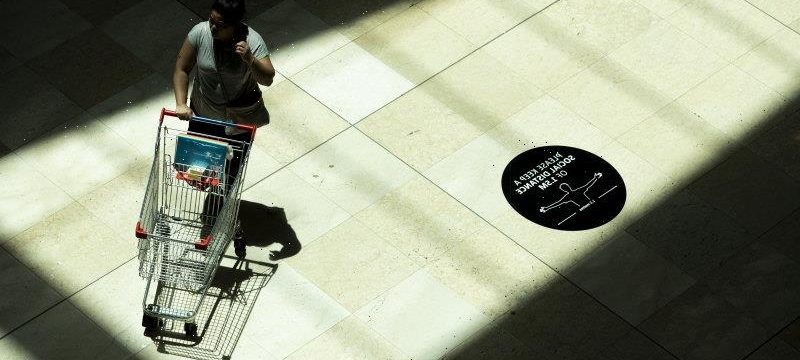Talking points
- Both major parties are heading into the May federal election with a larger than normal level of uncertainty about the economy.
- ANZ’s weekly measure of consumer confidence dropped almost 5 per cent in the past seven days, with shoppers now expecting inflation to reach 6 per cent.
- The lift in consumer prices is driving economists’ and financial markets’ expectations about when and how quickly the RBA will lift interest rates.
- Markets are now pricing in a cash rate of 2.5 per cent by the middle of August next year, which would be the most aggressive increase in interest rates this century.
Australia’s next treasurer faces their budget plans being upended by a global and domestic economy in disarray, with consumer concerns about inflation surging, growing fears of a recession in Europe and warnings the Reserve Bank could lift interest rates at their fastest pace this century.
Both major parties are heading into the May federal election with a larger than normal level of uncertainty about the economy. High inflation risks are already forcing central banks overseas into tightening ultra-easy monetary policy that has supported the world since the global financial crisis and through the COVID-19 recession.
Australian consumer confidence fell to its lowest level since the second Melbourne lockdown in 2020.Credit:Louie Douvis
ANZ’s weekly measure of consumer confidence, released on Tuesday, dropped by almost 5 per cent over the past seven days to its lowest level since Victoria entered its COVID-19 lockdown in September 2020.
People are increasingly worried about the immediate strength of the economy, where it will be in coming years and even whether it is a good time to buy a major household appliance.
Shoppers now expect inflation to reach 6 per cent, the highest expectation measured by the index since mid-2012. Inflation is at 3.5 per cent and tipped by economists to reach 5 per cent by June.
ANZ’s head of Australian economics, David Plank, said petrol prices were weighing on consumers who were struggling to deal with low wages growth and relatively elevated inflation.
“The weakness in consumer confidence presents a growing near-term risk to the outlook for household spending,” he said.
The lift in consumer prices is driving economists’ and financial markets’ expectations about when and how quickly the RBA will lift interest rates.
Financial markets are now pricing in a cash rate of 2.5 per cent by the middle of August next year, starting with a rate rise in July.
If fully passed on to a person with a mortgage of $830,000 – the average loan for a person buying an established house in NSW – their monthly repayments would increase by almost $1200.
It would be the most aggressive increase in interest rates this century. The last time the RBA lifted the cash rate by 2.5 percentage points it took almost six years, moving from 4.75 per cent to 7.25 per cent between June 2002 and March 2008.
Speaking in Sydney on Tuesday, RBA governor Philip Lowe said the bank would not respond to higher inflation until there were “pervasive price pressures”. He also said the bank was watching for signs the tight jobs market was pushing up labour costs and whether consumers’ perceptions of inflation were changing.
The head of the United States Federal Reserve, Jerome Powell, signalled overnight America’s central bank – which lifted interest rates from zero last week – was prepared to lift rates much higher and faster than expected to deal with inflation pressures.
Mr Powell said the Fed could take interest rates above what is described as a “neutral” level in a move that would be deliberately aimed at slowing the American economy.
“If we think it’s appropriate to raise [by half a percentage point] at a meeting or meetings, we will do so,” he said in Washington.
Capital Economics group chief economist Neil Shearing said there was a plausible risk of a recession across Europe due to the events playing out in Ukraine.
He said all major central banks were now looking to tighten interest rates to deal with inflation risks. Since the late 1970s, Britain, the US and the eurozone had gone through 16 tightening cycles, 15 of which ended in recession.
“Soft landings are hard to achieve,” he said.
Speaking in Cairns, Prime Minister Scott Morrison said in working on next week’s budget, he and Treasurer Josh Frydenberg were “extremely conscious” of the effect the war in Ukraine was having on fuel prices.
“These terrible events are having a big impact on the global economy and particularly on the price of oil by the barrel, and that is pushing the costs up,” he said. “And so the Treasurer and I have been working carefully to ensure that we get our response right in addressing the cost-of-living pressures that Australians are facing right across the spectrum.”
Shadow treasurer Jim Chalmers said there was a lot of uncertainty in the economy as it recovered from the pandemic, including around inflation and interest rates.
If Labor won the election, Dr Chalmers said it would be important to hand down a budget later in the year addressing key priorities including cleaner energy, skills shortages and childcare.
“If we were to win the election, we would look to budget for those priorities before the end of the year,” he said.
The Morning Edition newsletter is our guide to the day’s most important and interesting stories, analysis and insights. Sign up here.
Most Viewed in Politics
From our partners
Source: Read Full Article

